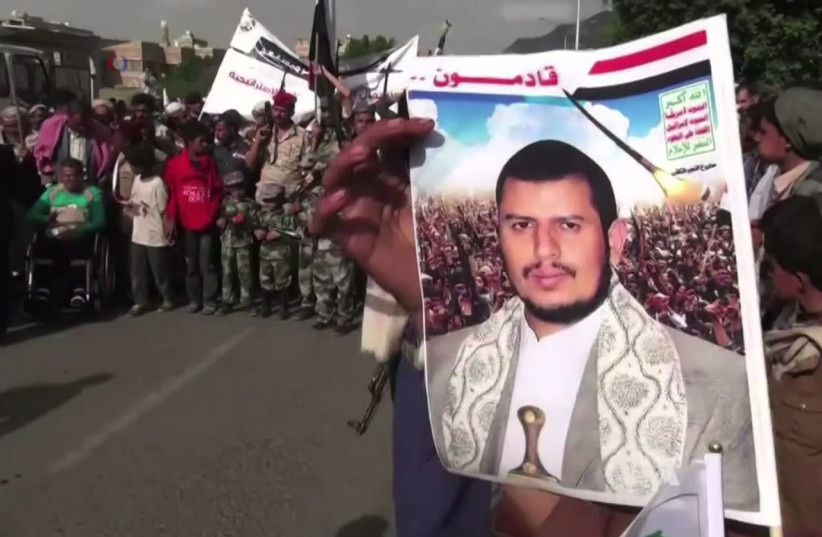Iran’s role in Yemen gives it the ability to project power into the Red Sea and the Bab al-Mandab Strait.
SETH J. FRANTZMAN

Although Iran’s Foreign Minister Javad Zarif and Supreme Leader Ayatollah Khamenei reject claims that their views are antisemitic, they have increasingly been highlighting their Yemenite Houthi allies of the Ansar Allah movement whose slogan is “curse the Jews.” The Houthis rose to prominence in 2015 when they rapidly conquered part of the country and threatened to take Aden.
Iran backs the Houthis against Saudi Arabia, which had intervened to prevent Aden from falling. Iran’s role in Yemen gives it the ability to project power into the Red Sea and the Bab al-Mandab Strait. It has shipped drones and missiles to the Houthis. The Houthi rebels call themselves Ansar Allah, and they make no secret of their views on Jews. Their official slogan is “God is great, death to America, death to Israel, curse the Jews, victory to Islam.”
Iran began to see the Houthis as a proxy force against Saudi Arabia in 2016 and 2017, and encouraged them to use drones and ballistic missiles to strike at Riyadh. They complied and in 2019 their drones were hitting Saudi cities weekly. Their ballistic missiles were flying hundreds of kilometers. Iran’s love affair with Ansar Allah grew to such an extent that when it planned the drone swarm attack on Saudi Arabia’s Abqaiq in September 2019 it gave the Houthis credit for the attack. This was done with agreement of the Houthi commanders.
Hassan Nasrallah, the Hezbollah leader and key Iran ally, also began to praise the Houthis. Increasingly he showed that Iran’s axis of alliances, which it calls “resistance” is like an Iranian version of the old Warsaw Pact, a serious alliance systems that combines Shi’ite religious fundamentalism, with an almost messianic worldview where Israel and the US are the central enemies, or “evil” and “satanic.”
Iran’s goal is to knit all its allies together. The Iranian Islamic Revolutionary Guard Corps gives its blessing to the iconography of Iran’s role, with the IRGC symbol of a fist clutching a rifle spreading around the Middle East like mushrooms popping up from the land. Iran’s IRGC has direct links to Iraqi-based Shi’ite militias, and has key links with Hezbollah, but in recent years Iran sought to move the Houthis, like a chess piece, to center stage. In October and November last year Prime Minister Benjamin Netanyahu warned that the Houthi threat was increasing. Qasem Soleimani, the IRGC Quds Force general that the US killed in January 2020, was part of the effort to support the Houthis. Iranian operatives went to Yemen under his watch.
Now on Iran’s Quds Day this year the regime in Tehran sought to give the Houthis even more credit and exposure. In Iraq the pro-Iranian groups put up posters in Diyala governorate with images of the Houthi leader. The Houthis also appeared in an official Khamenei poster that shows pro-Iranian groups praying in Jerusalem near the Dome of the Rock. The Houthis leaders have reportedly said they recognize the authority of the Iranian supreme leader as a kind of “commander of the faithful.” They appeared to give allegiance to Tehran in August last year.
— Lawk Ghafuri (@LawkGhafuri) May 21, 2020
Iran has put out posters during its attempt to hijack the Palestinian cause that call for a “final solution.” Iran’s Zarif claims this is not anti-Jewish. Khamenei says that the “resistance” is not antisemitic. “The enemies misinterpret the Islamic Republic’s idea of ‘eliminating Israel,’” he wrote on May 24. “Eliminating Israel does not mean eliminating Jewish people.” He claims that Jews live in peace in Iran.
However, the Houthis who are now under the Iranian banner and whose leader adorn Iran’s official propaganda openly say “curse the Jews.” This is not “curse Zionism,” but all Jews. This illustrates that behind the charade of Iran’s claim to merely oppose “Zionism” that Iran is pushing an antisemitic agenda as official policy. No country in the world has as its official slogan “curse the Muslims” or “curse the Christians,” only the Houthis and their ally in Iran are pushing the term “curse the Jews.” Iran’s allies put up the official poster of the Houthis with their slogan “curse the Jews” in Iraq on May 21. This is a clear sign that Tehran sees nothing wrong or controversial or offensive with cursing “the Jews.”
Content retrieved from: https://www.jpost.com/Middle-East/Iran-News/Iran-is-increasingly-promoting-antisemitic-Houthi-leader-from-Yemen-629430.